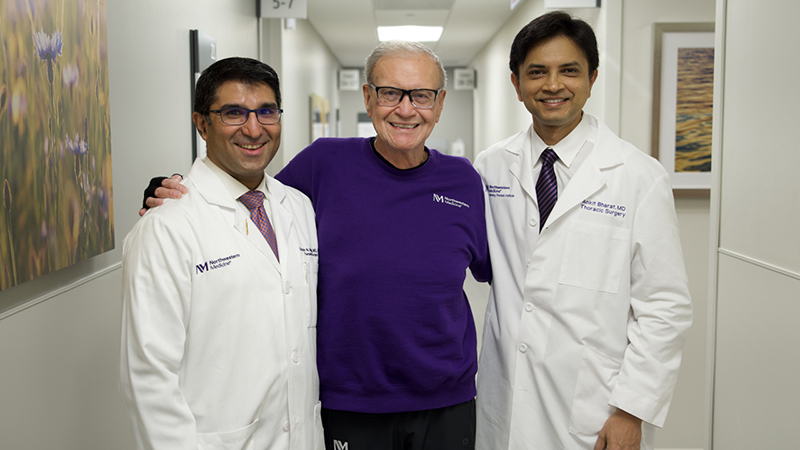Stroke at 23: Patient’s Powerful Perspective
Perseverance Through Rehabilitation
Jennifer “Jen” Kray was only 23 when she suffered a stroke. Now a few years older, Jen reflects on what — and who — it takes to recover from a devastating setback. After the near-fatal event, Jen continues to put one foot in front of the other, literally, with a positive attitude and a dedicated care team from Northwestern Medicine Marianjoy Rehabilitation Hospital.
Just three months away from graduating with her master’s degree in Occupational Therapy from St. Ambrose University, Jen was taking a break from her busy clinical rotations and enjoying a weekend at her family’s lake house in Wisconsin.
Suffering an overwhelming headache one morning, Jen lost control of the left side of her body, and she collapsed. With her medical training, she suspected she was having a stroke. “I thought maybe I was overthinking this. I was in shock and disbelief,” she says.
But the emergency department in Wisconsin confirmed her suspicion. Jen had a ruptured cavernous malformation, which is an abnormally formed group of blood vessels that caused an unexpected brain bleed. Her bleed was located in the pons, which is a division in the brain stem. A major injury to this area impacts areas that govern breathing, sleep-wake cycles and certain nerves at the base of the brain.
From Bad to Worse
The on-call surgeon felt the location of the bleed was too dangerous to operate on, and within hours, Jen’s family was told she would not likely survive. “It’s not something you want to hear,” says Jen’s father, Jim Kray.
Jen’s condition grew worse throughout the day. No longer responsive, Jen was placed onto a ventilator, slipped into a coma and was moved into palliative care. Then, a neurosurgeon conducting rounds asked about her case. He immediately performed surgery to relieve the pressure caused by internal bleeding. The next morning, Jen woke up. But she was unable to communicate, and could only move the tip of her right thumb.
It was only day one in her journey to recovery, a journey that spans three years and counting. Her recovery demands not just all of the physical strength she can muster, but mental strength, too.
Moving Forward
Jen’s journey to recovery brought her back to Illinois and landed her at Marianjoy Rehabilitation Hospital where she continues to participate in physical and occupational therapy. With its state-of-the-art technology and evidence-based rehabilitation treatment program, Marianjoy was a great fit for Jen, but she also had a personal connection to the facility.
“I used to volunteer at Marianjoy in high school, so it’s really come full circle,” she says. As a former occupational therapy student, Jen’s extensive knowledge has afforded her a unique perspective about the process. “Truly, all of my schooling has allowed me to adapt and problem-solve.”
Marianjoy is home to a wide variety of innovative equipment featuring virtual reality, robotics and biofeedback technology, which may contribute to better patient outcomes. For Jen, the Ekso GT™ Robotic Exoskeleton, a battery-powered frame that enables individuals to stand and walk, helped re-educate her muscles and allow her to walk again. Two specialized machines, a Zero G dynamic fall protection system and Bertec balance machine, are helping Jen relearn how to balance herself.
“Marianjoy has been wonderful,” Jen says. “The technology is amazing, and I love the therapists.”
And that feeling is mutual. One of her first therapists at Marianjoy, Theresa Fetter, PT, says Jen is always working towards her next step. “Given Jen’s background, she knows what research is out there,” says Theresa. “She has never seen an ending to her journey.”
Her current therapists readily agree. Her occupational therapist, Beth Bosak, OTR/L, MHS, says, “She’s never out of persistence. If you ask her to do something 100 times, she’ll ask if it will hurt her to do 20 more.”
Her physical therapist, Jessica Taggart, PT, DPT, adds, “It’s been really great seeing her improve and conquer the odds. I hope others learn from her journey to keep working hard and never give up hope.”
“Have I Done Enough?”
Jen, an avid runner before her stroke, still enjoys going to the family’s lake house and uses adaptive equipment to go fishing and boating, and enjoy the outdoors. Her previous running partner, her dog Molly, has a new role. “We like to call her my therapy dog now, but she’s too mischievous for that,” she says with a laugh. “I have a goal to run with her again someday, but I know that is in God’s hands.”
She may not be running yet, but Jen has returned to racing. She participated in a 5K race with her family and Marianjoy therapists by her side. She rolled her wheelchair throughout much of the course, and she was the last to finish, but Jen proudly walked across the finish line. Recalling the moment, Theresa says, “She really puts into perspective what it means to persevere and work really, really hard.”
Looking back, Jen says the experience has been surreal. But she uses her unique perspective to help others. She routinely speaks at her former school to students going into the field of rehabilitation. “Life is about giving to others,” she says.
That philosophy dogged her on that fateful day in the emergency department. Knowing the dire situation she was in, Jen admits that only one question kept racing through her mind: “Have I given back enough?”
While this isn’t the path she expected to be on, Jen embraces what the future has in store. “It’s easy to feel like something is a setback, but it’s not,” she explains. “It’s a new path in your life and an opportunity for change. Trust the situation.” Jen’s trust in her situation and in her Marianjoy care team is helping her walk a new path with confidence and optimism.





